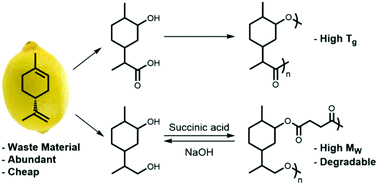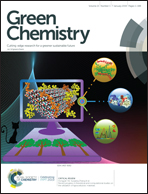New renewably-sourced polyesters from limonene-derived monomers†
Abstract
The functionalisation of limonene has enabled the synthesis of two renewably-sourced monomers for the formation of terpene-derived polyesters. Three methods for the synthesis of the novel hydroxy-acid 6 are reported and their green-credentials scrutinised through comparison of their sustainability-metrics. Step-growth homo-polymerisation of 6 is demonstrated to yield a low molecular weight (2.6 kDa) novel polyester with 100% of its carbon content originating from the terpene starting material. The corresponding diol 2 is shown to act as a co-monomer with a renewable diacid. The resultant polyesters display impressive Mns of up to 30 kDa with Tgs between −6 and 24 °C. These materials have been shown to depolymerise under basic conditions for reclamation of the diol monomer 2.



 Please wait while we load your content...
Please wait while we load your content...